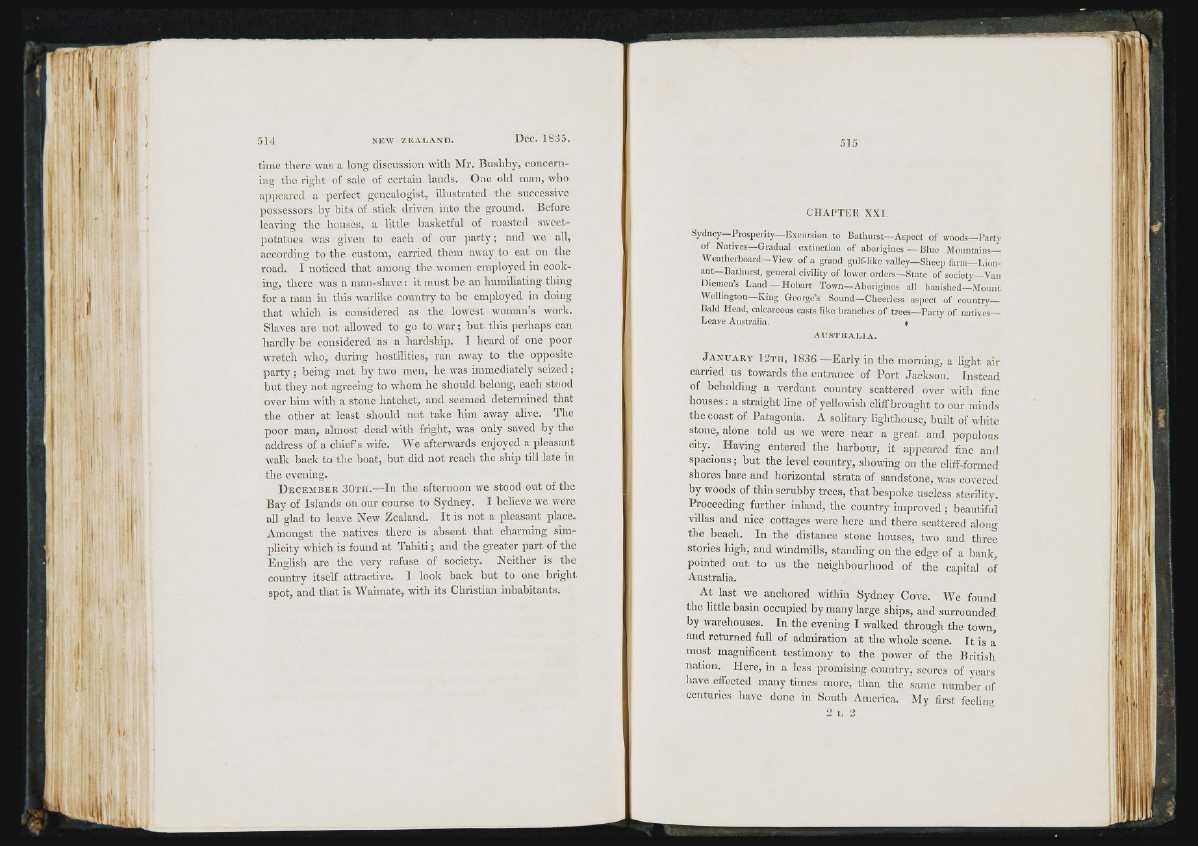
i l i ri ■ ■
i!
!, i " I
■?I ’M■ I ■. ;; ' : ] f
■ f ■'<
Ui!| : ; !■ '.r I.
' 6,
: il
l i : 7 "
S' ■ '
i . l I ,1 ’
time there was a long discussion with Mr. Bushby, concern-
iiioO- the rioffht of sale of certain lauds. One old man, who
appeared a perfect genealogist, illustrated the successive
possessors by hits of stick driven into the ground. Before
leaving the houses, a little basketful of roasted sweet-
potatoes was given to each of our party; and we all,
according to the custom, carried them away to eat on the
road. I noticed that among the women employed in cooking,
there was a man-slave: it must be an humiliating thing
for a man in this warlike country to be employed in doing
that which is considered as the lowest woman’s work.
Slaves are not allowed to go to war; but this perhaps can
hardly be considered as a hardship. I heard of one poor
wretcii who, dm-ing hostilities, ran away to the opposite
party ; being met by two men, he was immediately seized ;
hut they not agreeing to whom he should belong, each stood
over him with a stone hatchet, and seemed determined that
the other at least should not take him away alive. The
poor man, almost dead with fright, was only saved by the
address of a chief’s wife. We afterwards enjoyed a pleasant
walk back to the boat, but did not reach the ship till late in
the evening.
D e c e m b e r 3 0 t h .—In the afternoon we stood out of the
Bay of Islands on our course to Sydney. I believe we were
aU glad to leave New Zealand. It is not a pleasant place.
Amongst the natives there is absent that charming sim-
phcity which is found at Tahiti; and the greater part of the
English are the very refuse of society. Neither is the
country itself attractive. I look back hut to one bright
spot, and that is Waimate, with its Christian mhabitants.
C H A P T E R X X I .
S y d n e y - P r o s p c r i ty— E x c u r s io n to B a th u r s t— A sp e c t o f woods— P a r ty
o f N a tiv e s— G r a d u a l e x tin c tio n o f a b o rig in e s — B lu e M o u n ta in s—
W e a tlle rb o a rd— View o f a g ra n d g u lf-lik e v a lley— S lie ep fiirm— L io n -
a n t— B a th u rs t, g e n e ra l c iv ility o f low e r o rd e rs— S t a te o f so c ie ty— Van
D iem e n ’s L a n d — H o b a r t T ow n— A b o rig in e s a ll b a n is h e d— M o u n t
W e llin g to n— K in g G eo rg e ’s S o u n d— C h e e rle s s a sp e c t o f c o u n try—
B a ld H e a d , c a lc a reo u s ca sts lik o b ran c h e s o f tr e e s— P a r ty o f n a tiv e s—
L e a v e A u s tra iia . •
A U S T R A L I A .
J a n u a r y 1 2 t h , 1 8 3 6—Early in the morning, a light air
carried us towards the entrance of Port Jackson. Instead
of beholding a verdant country scattered over with fine
houses : a straight line of yellowish cliff brought to our minds
the coast of Patagonia. A solitary lighthouse, built of white
stone, alone told us we were near a great and populous
city.^ Having entered the harbour, it appeared fine aud
spacious; but the level country, showing on the clift'-formed
shores bare and horizontal strata of sandstone, was covered
by woods of thin scrubby trees, that bespoke useless sterility.
Proceeding further inland, the country improved; beautiful
vdlas and nice cottages were here and there scattered alono-
the beach. In the distance stone houses, two and three
stories high, and windmills, standing on the edge of a bank,
pointed out to us the neighbourhood of the capital of
Australia.
At last we anchored within Sydney Cove. We found
the little basin occupied by many large ships, and surrounded
by warehouses. In the evening I walked through the town,
and returned full of admiration at the whole scene. It is a
most magnificent testimony to the power of the British
nation. Here, in a less promising country, scores of years
have effected many times more, than the same uumlier of
centuries have done in South America. My first feeling
2 L 2
■NIM